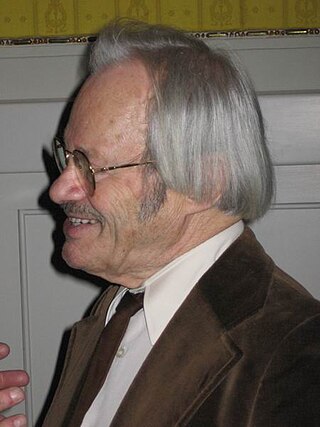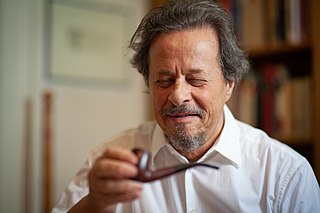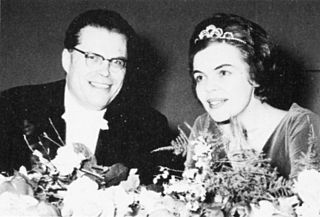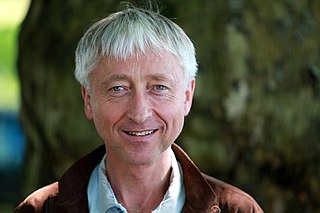
Christoph Wigelbeyer [1] (born 1973) is an Austrian choir director, conductor, singer and music educator.

Christoph Wigelbeyer [1] (born 1973) is an Austrian choir director, conductor, singer and music educator.
Born in Wels, Wigelbeyer completed singing school, piano and violin in his hometown and at the Linz Bruckner Conservatory within the framework of the Upper Austrian promotion of young talent. This was followed by teacher training in music education and instrumental music education with a focus on singing and choral conducting, as well as three years of solo singing training at the University of Music and Performing Arts Vienna, in addition to which he completed master classes and private lessons. In 1998, in his diploma thesis, he portrayed Ernst Ludwig Leitner, also born in Wels. [2] A year later, he also wrote an essay about Leitner in the Österreichische Musikzeitschrift . [3]
He sang, among others, in the Wiener Kammerchor and the Wiener Singverein (directed by Johannes Prinz ) and in the Vocal Ensemble Company of Music (conducted by Johannes Hiemetsberger ). [4] On piano, he can be heard on Nancy Van de Vate's 1998 album Vol. IV together with Elke Eckerstorfer and Sybille Bouda, among others, with the piece Contrasts for two Pianos, six Hands (1984). [5] [6] With Eckerstorfer, he also played the Little Suite for twenty fingers op. 61b by Iván Eröd on a CD published in 1997 by the Department of Music Pedagogy at the University of Music and Performing Arts Vienna. [7]
From 2006 to 2008, Wigelbeyer was a member of the Mainstream vocal ensemble and was, among other things, at the farewell concert on 21 December 2008 at the Wiener Metropol . Part of the ensemble. [8] In 2010, he founded the youth choir pro.vocant, which he directed until 2013.
Since mid-2013, Wigelbeyer has directed the youth choir Neue Wiener Stimmen , founded by Johannes Hiemetsberger and Jürgen Partaj, with around 80 singers, which is a project of the Musikalische Jugend Österreichs . [4] Together with Hiemetsberger, he was previously responsible for the choral rehearsal on the occasion of the accompaniment of the spring 2013 programme of the Schweizer Jugendsinfonieorchester by the "Neue Wiener Stimmen". [9] The Neue Wiener Stimmen also performed, among others, at the film music festival Hollywood in Vienna from 2012 to 2016 [10] and, under Wigelbeyer's and Jürgen Partaj's direction, were awarded the title of Choir of the Year 2016 at the Chorforum Wien in January 2017 with the programme "Austria: great daughters, great sons!" [11] Other projects of the choir under Wigelbeyer's direction include performances at the opening of Vienna's Life Ball (2014 and 2015), at the Milan Expo 2015, at the opening of the 2016 Carinthischer Sommer and at the Liszt Festival 2017 in Raiding. [12]
Wigelbeyer is a full-time teacher and choir director at the Bundesgymnasium und Bundesrealgymnasium Wien III . Under his direction, the upper school choir received the rating "very good" at the 2007 Bundesjugendsingen and was subsequently allowed to participate in the performance of the compulsory piece at the final concert in the Festspielhaus Bregenz , a cantata composed especially for the occasion by Herwig Reiter. [13]
He is also a lecturer at the Institute for Music Education Research, Music Didactics and Elementary Music Making at the University of Music and Performing Arts in Vienna.
(made during his time as artistic director with the Neue Wiener Stimmen choir).

Friedrich Cerha was an Austrian composer, conductor, and academic teacher. His ensemble Die Reihe in Vienna was instrumental in spreading contemporary music in Austria. He composed several operas, beginning with Baal, based on Brecht's play. He is best known for completing Alban Berg's opera Lulu by orchestrating its unfinished third act, which premiered in Paris in 1979.

Helgoland, WAB 71, is a secular, patriotic cantata for male choir and orchestra, composed by Anton Bruckner in 1893. Since Bruckner did not complete the 9th symphony, Helgoland is his last complete work.

Georg Friedrich Haas is an Austrian composer. In a 2017 Classic Voice poll of the greatest works of art music since 2000, pieces by Haas received the most votes (49), and his composition in vain (2000) topped the list.

Iván Erőd was a Hungarian-Austrian composer and pianist. Educated in Budapest, he emigrated to Austria in 1956, where he studied at the Vienna Music Academy. He was successful as a pianist and composer of operas, chamber music and much more, with elements from serialism, Hungarian folk music and jazz. He first was a professor of music theory and composition at the University of Music in Graz (1967–1989), then a professor of composition at the Vienna Music Academy from 1989.

The Mozart Medal of the Mozartgemeinde Wien was a music award named after Wolfgang Amadeus Mozart.
Gerhard Präsent is an Austrian composer, conductor and academic teacher.
The ALEA Ensemble is a chamber music ensemble founded in 1988 in Graz for contemporary music, playing in variable formation including the ALEA Quartet.

Rita Katherine Steblin was a musicologist, specializing in archival work combining music history, iconography and genealogical research.

Johann Baptist Malfatti, Edler von Monteregio baptized as Giovanni Domenico Antonio Malfatti was an Italian/Austrian doctor famous for treating the composer Ludwig van Beethoven.

Erik Werba was an Austrian classical pianist who is especially known as an accompanist of singers. He was also a music critic, conductor, composer, author and academic teacher.
Johann Baptist Henneberg was an Austrian composer, pianist, organist and Kapellmeister.

Herbert Willi is an Austrian composer of classical music, whose orchestral works, concertos and chamber music have been performed internationally and also recorded. Willi composed an opera, Schlafes Bruder, for the Opernhaus Zürich.

Marion Diederichs-Lafite is an Austrian music journalist.
Gösta Neuwirth is an Austrian musicologist, composer and academic teacher. He studied in Vienna and Berlin, where he wrote a dissertation on harmony in Franz Schreker's Der ferne Klang. He has taught at universities and music schools including the Musikhochschule Graz, University of Graz, Universität der Künste Berlin and University of Freiburg. His compositions include a string quartet and a chamber opera.
Karl Hubert Rudolf Schiske was an Austrian composer and musical composition professor.
Hans Schmidt was a German musicologist.

Ludwig Speidel was a German writer, which in the second half of the 19th century was the leading music, theater and literary critic in Vienna.
Ernst Ludwig Leitner is an Austrian composer, organist and academic teacher.
Elke Eckerstorfer is an Austrian pianist, organist and harpsichordist.
Nina Stollewerk Rosthorn was an Austrian composer, conductor, and singer who was one of the most widely-reviewed female composers of her time, and one of the few 19th-century women to conduct an orchestra.